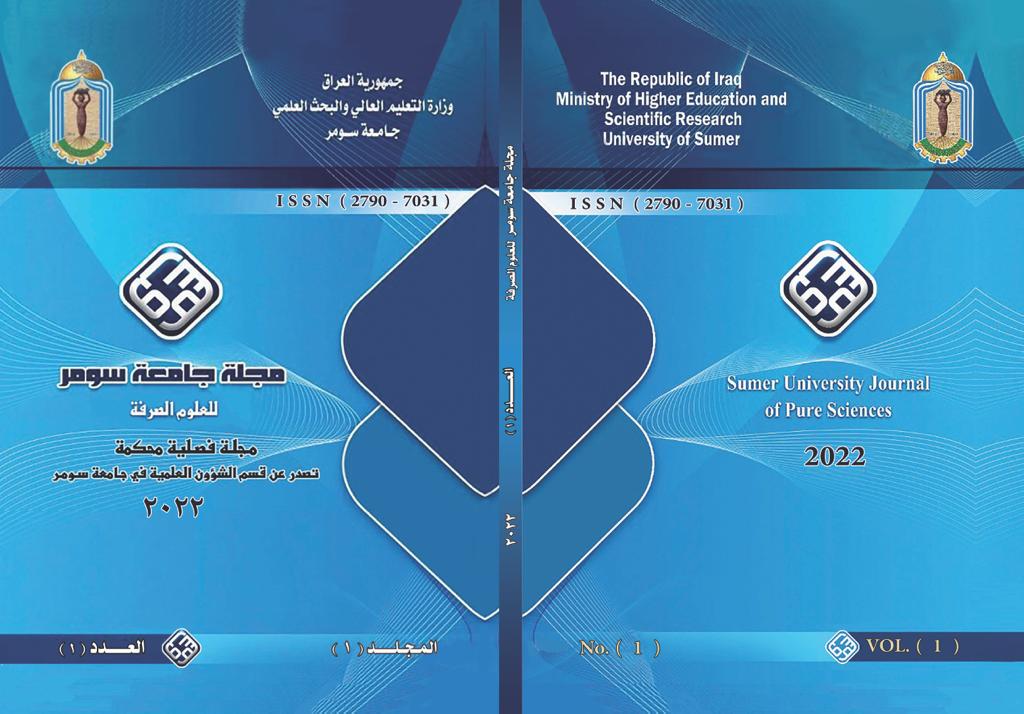Abstract
This study is carried out to investigate and evaluate the level of cultural and health awareness of workers in some restaurants in the city of Karbala. And the extent of their application of health conditions in preparing kebabs for consumers and its relationship to the microbial content .It was found through the questionnaire forms and the personal interviews that the health conditions weren’t applied, due to poor health awareness, and lack of knowledge of the factors of food contamination with microbes. Therefore, microbial contamination in the kebab was investigated during its manufacturing stages. The study included randomly selecting 10 restaurants in a center of the city centre and surrounding areas, the number of samples studied were 20 samples of minced meat and 20 samples of raw kebabs for the period from 1/7-28/7/2021 (total samples 160 ), the microbial tests included, total plate count (TPC) and total coliform bacteria (TC) and Staphylococcus aureus (SA), as well as Salmonella test. The result of this study showed that TPC, TC, SA ,in minced meat is 10.1 - 13.7 x 107 CFU / g, 11.9 - 15.1 x 105 CFU / g, 5.3 - 9.1 x 105 CFU / g, respectively. Salmonella test was negative in all samples. And in raw kebab were 11.2 - 15.2 x107 CFU / g, 12.6 - 16.9 x 105 CFU / g, 6.1 - 10.2 x 105 CFU / g, respectively. Salmonella test was positive in 16 samples in minced meat from 80 samples, during the study period (the Percentage of contamination was 20 %). And all of kebab’s meat were negative identified or did not contain E. coli, Staphylococcus aureus, and Salmonella , after the grilling process.When comparing these results with the microbial limits of the Iraqi standard (2006) , it was found that more than 70% of the samples contaminated exceeded the maximum limit. We also identified, through this study, the weakness of the cultural and health level of some restaurant workers with regard to preparing kebabs in the correct way.
Keywords
contamination
Microbiology
Minced Meat
Raw Kebabs
Salmonella.
Abstract
اجريت هذه الدراسة لمعرفة وتقييم مستوى الوعي الثقافي والصحي للعاملين في بعض المطاعم في مدينة كربلاء ومدى تطبيقهم للشروط الصحية في تحضير الكباب للمستهلكين وعلاقتها بالمحتوى الميكروبي. وتبين من خلال استمارات الاستبيان والمقابلات الشخصية عدم تطبيق الشروط الصحية، وضعف الوعي الصحي بمعرفة عوامل تلوث الغذاء بالميكروبات. تم دراسة التلوث الميكروبي في الكباب خلال مراحل تصنيعه حيث شملت الدراسة 10 مطاعم اختيرت عشوائياً في مركز المدينة والمناطق المحيطة بها، وكان عدد العينات المدروسة 20 عينة لحم مفروم و20 عينة كباب نيئ للفترة من 1/7-28/7/2023 (مجموع العينات الإجمالي 160)، شملت الاختبارات الميكروبية، العد الكلي للصفائح (TPC) والبكتيريا القولونية الكلية (TC) والمكورات العنقودية الذهبية (SA)، وكذلك اختبار السالمونيلا. أظهرت نتائج هذه الدراسة أن TPC, TC, SA في اللحم المفروم هي 10.1 - 13.7 × 107 CFU / جم، 11.9 - 15.1 × 105 CFU / جم، 5.3 - 9.1 × 105 CFU / جم، على التوالي. وكان اختبار السالمونيلا سلبيا في جميع العينات. وفي الكباب الخام كانت 11.2 - 15.2 x107 CFU / جم، 12.6 - 16.9 x 105 CFU / جم، 6.1 - 10.2 x 105 CFU / جم، على التوالي. وجاء اختبار السالمونيلا إيجابيا في 16 عينة في اللحم المفروم من أصل 80 عينة خلال فترة الدراسة (أي أن نسبة التلوث كانت 20%). وقد تم تشخيص جميع لحوم الكباب بأنها سلبية أو لا تحتوي على الإشريكية القولونية والمكورات العنقودية الذهبية والسالمونيلا بعد عملية الشوي. وعند مقارنة هذه النتائج مع الحدود الميكروبية للمعيار العراقي (2006) وجد أن أكثر من 70 نسبة العينات الملوثة تجاوزت الحد الأقصى. كما تعرفنا من خلال هذه الدراسة على ضعف المستوى الثقافي والصحي لدى بعض العاملين في المطاعم فيما يتعلق بإعداد الكباب بالطريقة الصحيحة التي لا تؤثر على صحة المواطن.
